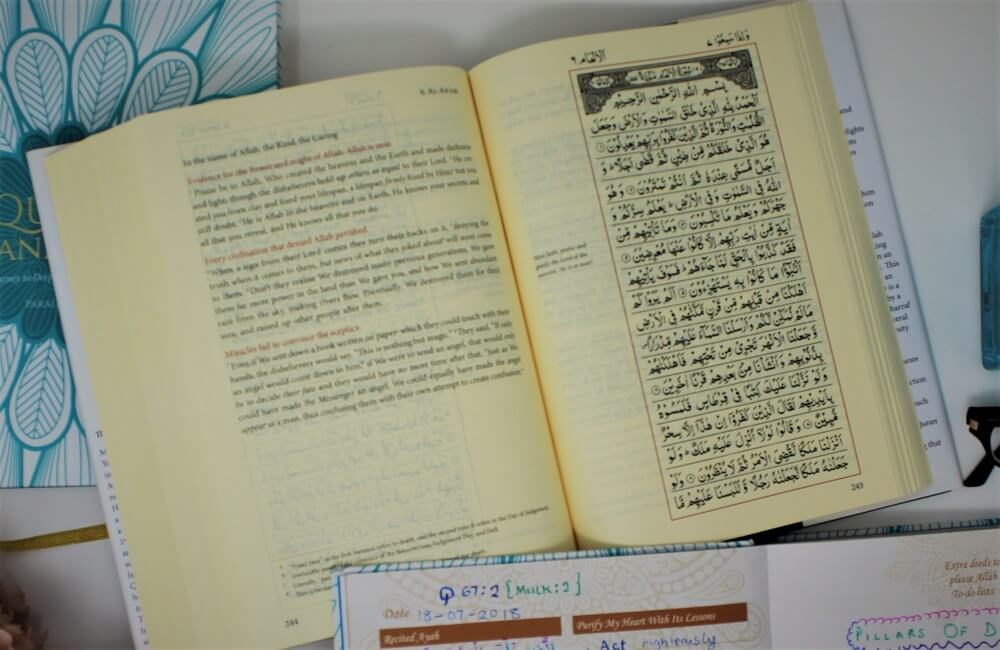Islam’s primary holy source, the Quran, is regarded as the authentic word of God as given to the Prophet Muhammad. It is a book that offers advice on many facets of life, including interpersonal interactions and societal and economic structures. Muslims consider the Quran to be a practical guide that offers guidelines for leading a fruitful and meaningful life.

The 114 chapters, or surahs, that make up the Quran are arranged in length order, with the longest surahs appearing first. The verses, or ayat, that make up each surah are written in Arabic and are regarded as the actual words of God. Muslims hold that the Prophet Muhammad received the Quran during a 23-year period; it was then collected into one book after his passing.
The idea that the Quran is a useful guide to living is one of Islam’s central tenets. This indicates that it offers instructions on how to live a fruitful and meaningful life in line with God’s desire. Numerous subjects, such as ethical behavior in the workplace, interpersonal interactions in families, and social justice are covered in the Quran. It offers instructions on how to make moral judgments, how to treat others with respect and compassion, and how to lead a life that pleases God.
The idea of tawheed, or the oneness of God, is one of the Quran’s most crucial doctrines. Muslims hold that there is only one God and that He is the creator of all objects and other living things. Islam places a high value on this idea, which is reflected in the Quran’s guidance on morality and social justice. Muslims are instructed to treat everyone with dignity and respect, regardless of their color, ethnicity, or religion, and to strive for societal improvement.
The Quran also offers instructions on how to lead a balanced life. It highlights the need of preserving excellent physical and mental health and offers suggestions on how to do so. Muslims are urged to maintain a nutritious diet, engage in regular exercise, and look after their mental and emotional wellbeing. The Quran also exhorts Muslims to learn more and further their education in order to better themselves and their societies.
The significance of prayer is yet another fundamental tenet of Islam. Muslims are supposed to pray five times daily, and the Quran contains instructions on how to do so. Prayer is viewed as a tool to improve one’s relationship with God and as a way to thank God for all of life’s benefits. Muslims are also encouraged to perform charitable deeds and to contribute liberally to those in need as a way to thank God and to benefit others.
The Quran also offers instructions on how to sustain good interpersonal interactions. It emphasizes the significance of treating others with respect and compassion and offers suggestions for how to settle disputes amicably and productively. The Quran also offers instructions on how to sustain harmonious relationships within families and exhorts Muslims to put their families first above all else.
Islam encourages its adherents to be honest in all aspects of life, especially when it comes to trade in the form of buying and selling.
“O you who believe! Stand out firmly for Allah, as witness to fair dealing, and let not hatred of others make you swerve to wrong and depart from justice. Be just: and fear Allah. For Allah is well-acquainted with all that you do.” (5:8)
It does not place special emphasis on a person’s religious life. In the Quran, Allah Almighty declares that fairness in trade is just as important as honesty in commerce, particularly when it comes to measuring and weighing items.
“Give full measure when you measure, and weigh with an even balance. That is the best (way) and best in result.” (17:35)
Therefore, Islam calls for its adherents to be just in their dealings, and when it comes to weighing or measuring products for the purpose of selling or buying, one must also be fair and just in that profession, according to Allah Almighty in the Quran.
Everyone engages in hiring labor on a daily basis in one way or another. Islam commands its adherents to pay laborers’ wages promptly and without delay in order to ensure that they receive their entitlements immediately. In this regard, the Prophet Muhammad (PBUH) said:
“Allah says: ‘I will be against three persons on the Day of Resurrection: One who makes covenant in My Name, but he proves treacherous; One who sells a free person (as a slave) and eats the price; and One who employs a laborer and gets the full work done by him but does not pay him his wages.” (Bukhari)
As a result, whereas receiving wages on time is a right of labor in other communities, it is a requirement of Islam.
The idea of justice is one of the Quran’s most essential principles. Muslims are instructed to fight for justice, speak out against oppression, and try to build a society that is more fair and just. The Quran offers instructions on how to do this, highlighting the significance of treating everyone equally and compassionately and working to improve society as a whole.
The Quran is a useful manual that offers advice on all facets of living. It offers advice on social justice, business ethics, interpersonal relationships, and much more. Muslims hold that the Quran is the genuine word of God and that it contains instructions on how to lead a fruitful and meaningful life. Muslims strive to better themselves, their communities, and the world at large by adhering to the Quran’s teachings. There is no aspect of life that Islam has not addressed, either through Quranic verses or through the traditions of the Prophet Muhammad (PBUH). Therefore, before turning to any other book or worldly law anytime a Muslim needs direction regarding any part of life, he or she must first study both of these sources.




